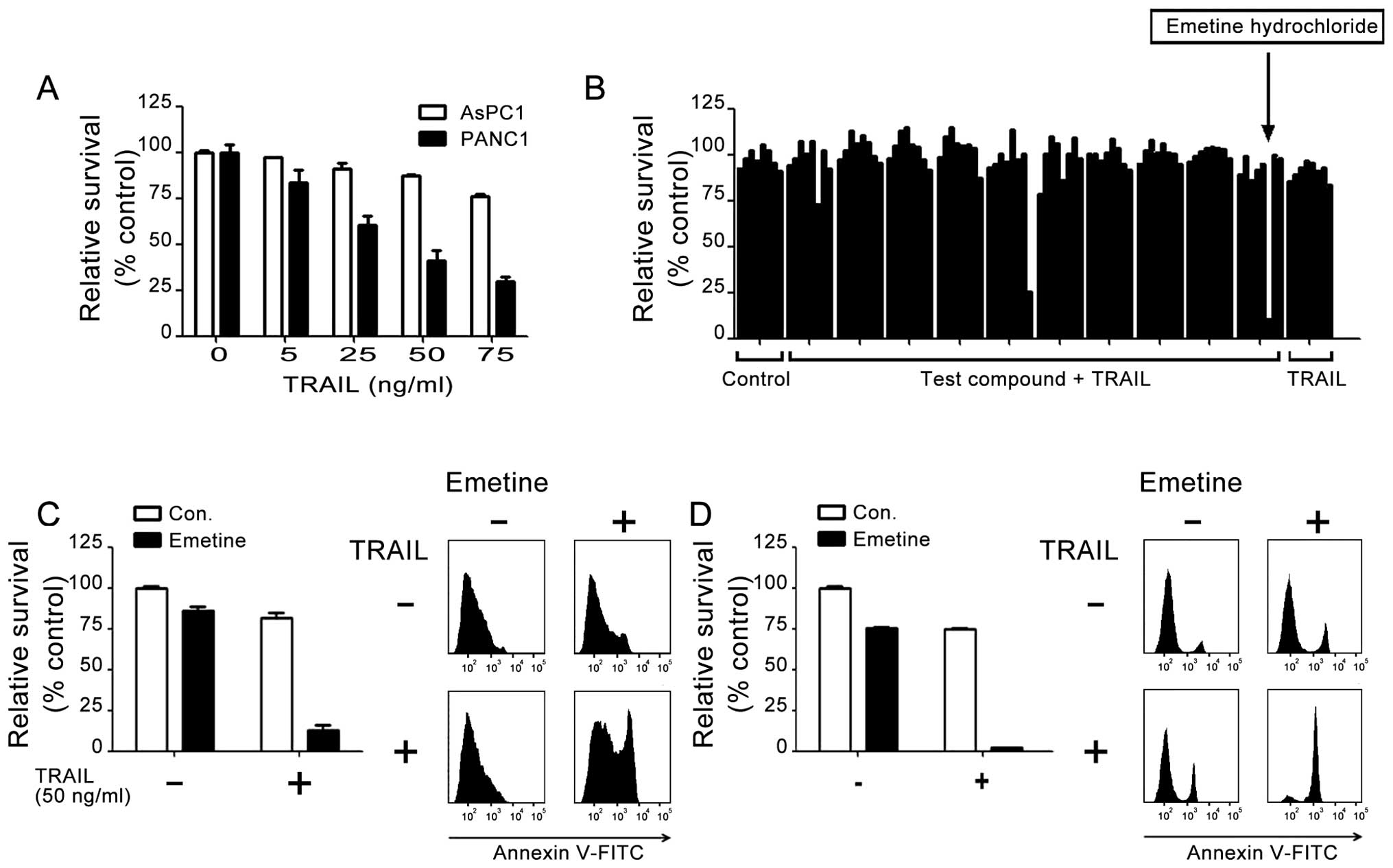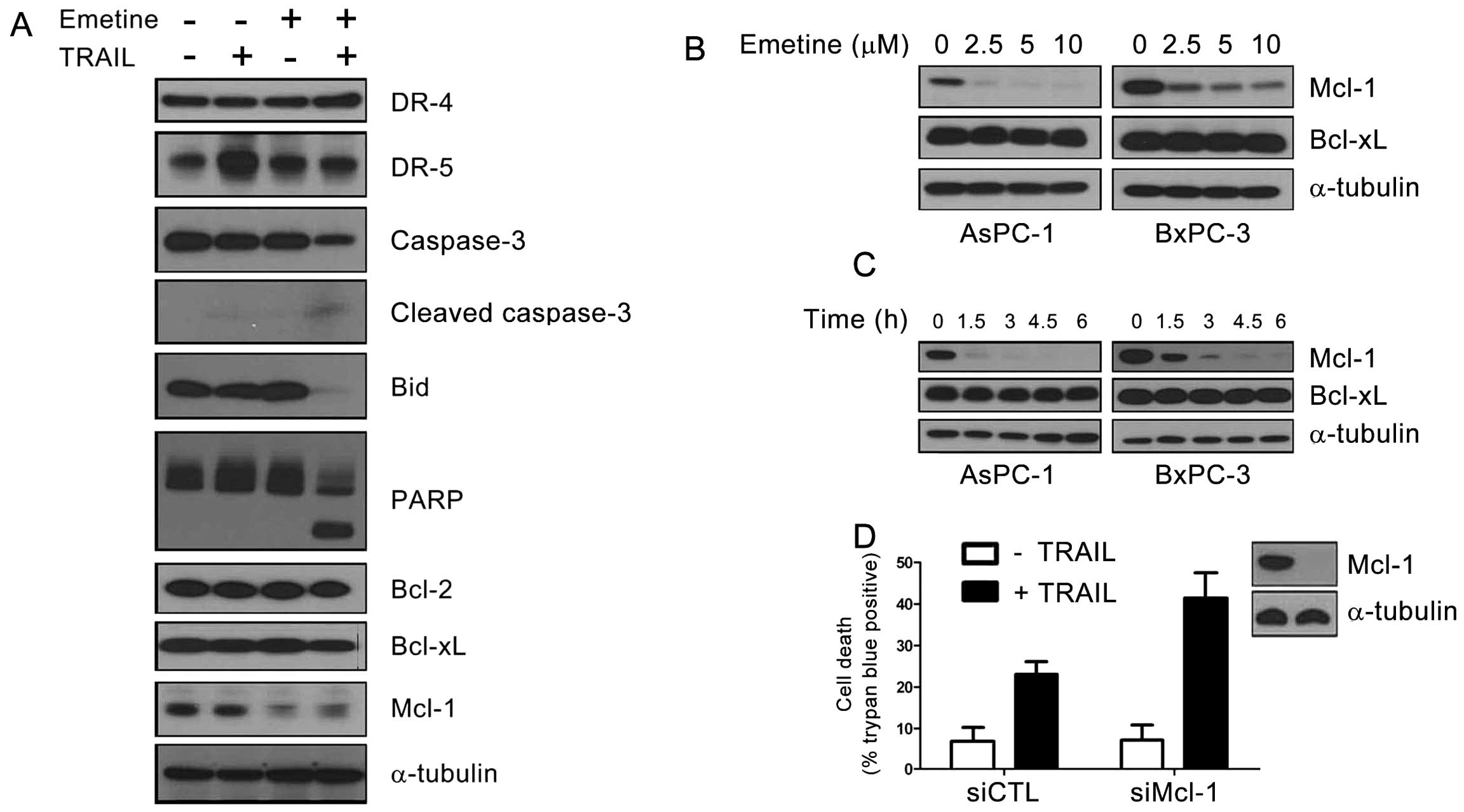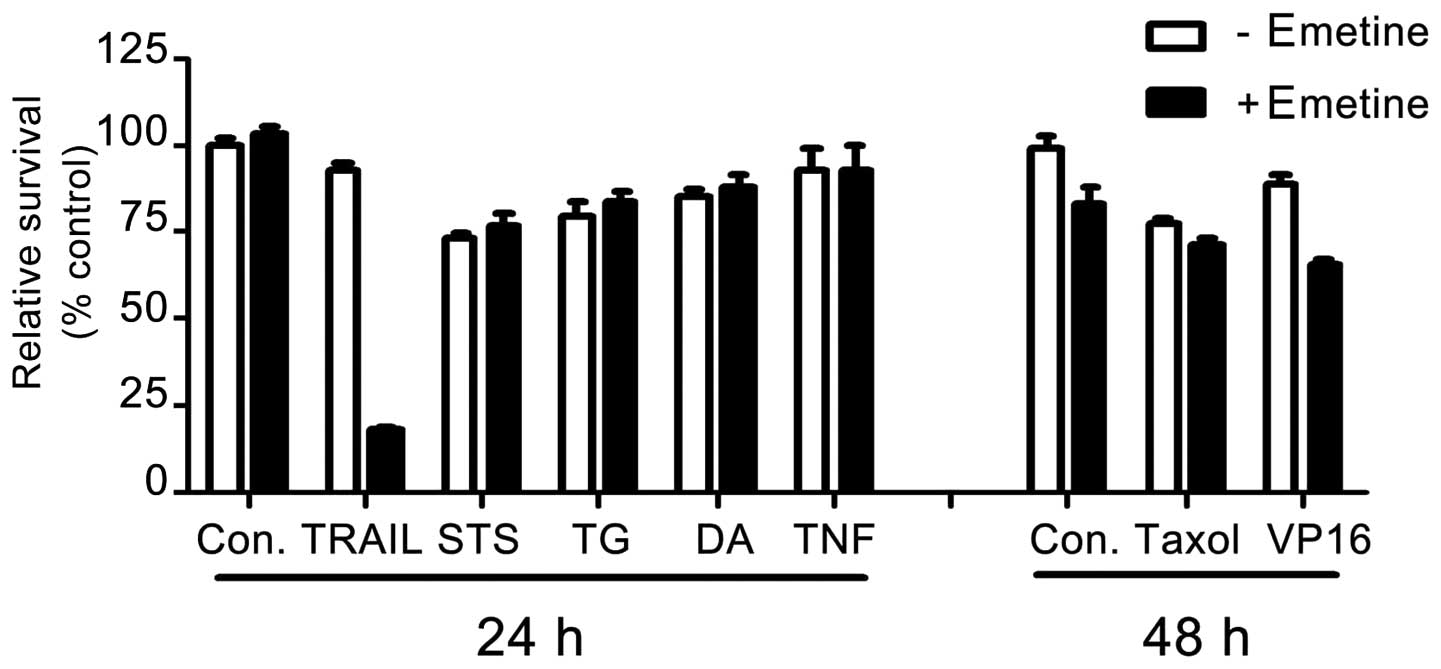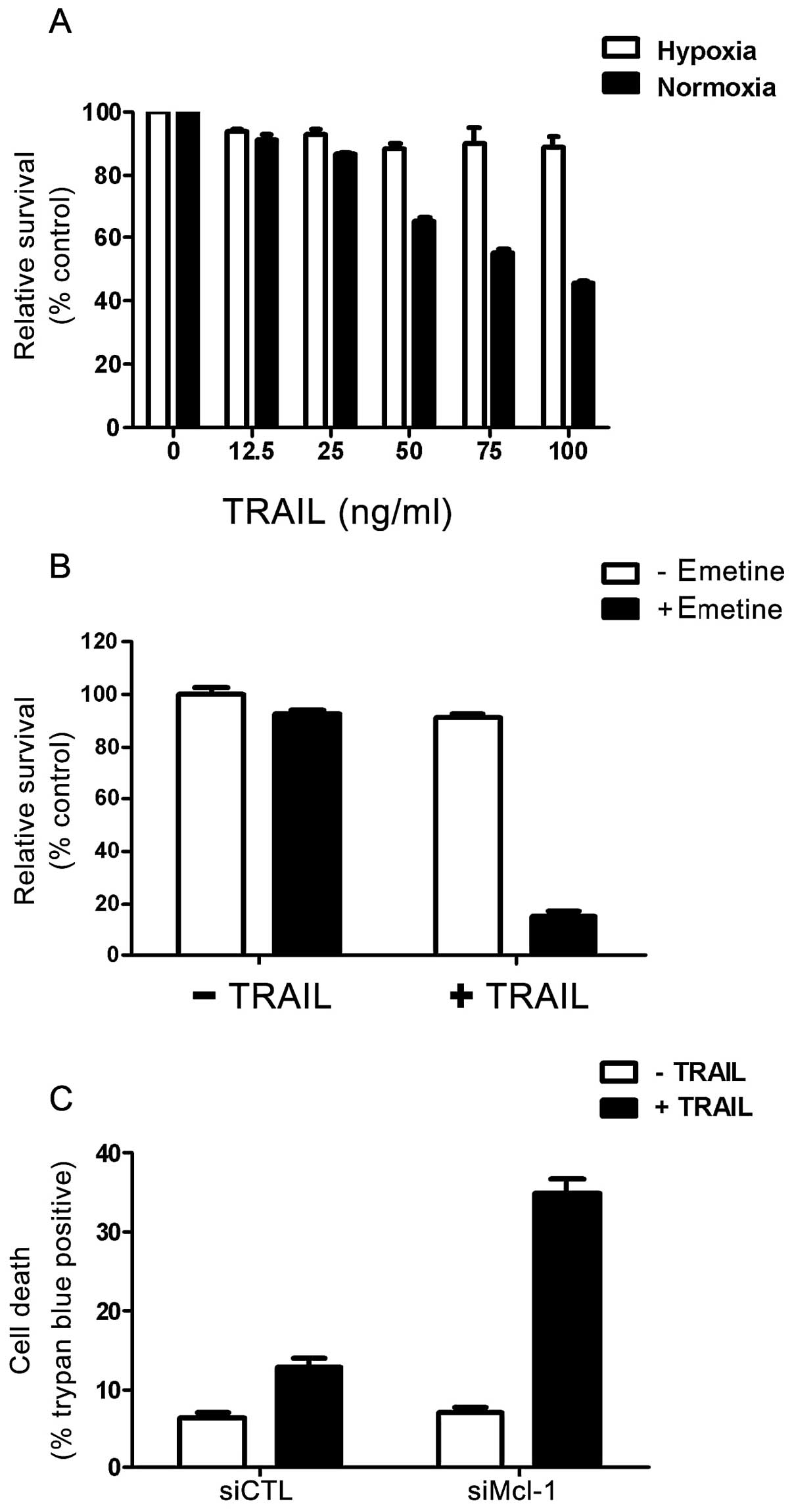|
1
|
Schneider G, Siveke JT, Eckel F and Schmid
RM: Pancreatic cancer: basic and clinical aspects.
Gastroenterology. 128:1606–1625. 2005. View Article : Google Scholar : PubMed/NCBI
|
|
2
|
Wong HH and Lemoine NR: Pancreatic cancer:
molecular pathogenesis and new therapeutic targets. Nat Rev
Gastroenterol Hepatol. 6:412–422. 2009. View Article : Google Scholar : PubMed/NCBI
|
|
3
|
Hamacher R, Schmid RM, Saur D and
Schneider G: Apoptotic pathways in pancreatic ductal
adenocarcinoma. Mol Cancer. 7:642008. View Article : Google Scholar : PubMed/NCBI
|
|
4
|
Favaloro B, Allocati N, Graziano V, Di
Ilio C and De Laurenzi V: Role of apoptosis in disease. Aging
(Albany NY). 4:330–349. 2012.
|
|
5
|
Lavrik I, Golks A and Krammer PH: Death
receptor signaling. J Cell Sci. 118:265–267. 2005. View Article : Google Scholar
|
|
6
|
Pan G, O’Rourke K, Chinnaiyan AM, et al:
The receptor for the cytotoxic ligand TRAIL. Science. 276:111–113.
1997. View Article : Google Scholar : PubMed/NCBI
|
|
7
|
Ashkenazi A and Dixit VM: Apoptosis
control by death and decoy receptors. Curr Opin Cell Biol.
11:255–260. 1999. View Article : Google Scholar : PubMed/NCBI
|
|
8
|
Pitti RM, Marsters SA, Ruppert S, Donahue
CJ, Moore A and Ashkenazi A: Induction of apoptosis by Apo-2
ligand, a new member of the tumor necrosis factor cytokine family.
J Biol Chem. 271:12687–12690. 1996. View Article : Google Scholar : PubMed/NCBI
|
|
9
|
Bellail AC, Qi L, Mulligan P, Chhabra V
and Hao C: TRAIL agonists on clinical trials for cancer therapy:
the promises and the challenges. Rev Recent Clin Trials. 4:34–41.
2009. View Article : Google Scholar : PubMed/NCBI
|
|
10
|
Van Geelen CM, de Vries EG and de Jong S:
Lessons from TRAIL-resistance mechanisms in colorectal cancer
cells: paving the road to patient-tailored therapy. Drug Resist
Updat. 7:345–358. 2004.PubMed/NCBI
|
|
11
|
Bhojani MS, Rossu BD and Rehemtulla A:
TRAIL and anti-tumor responses. Cancer Biol Ther. 2:S71–S78. 2003.
View Article : Google Scholar
|
|
12
|
Koschny R, Walczak H and Ganten TM: The
promise of TRAIL - potential and risks of a novel anticancer
therapy. J Mol Med (Berl). 85:923–935. 2007. View Article : Google Scholar : PubMed/NCBI
|
|
13
|
Wang P, Zhang J, Bellail A, et al:
Inhibition of RIP and c-FLIP enhances TRAIL-induced apoptosis in
pancreatic cancer cells. Cell Signal. 19:2237–2246. 2007.
View Article : Google Scholar : PubMed/NCBI
|
|
14
|
Hylander BL, Pitoniak R, Penetrante RB, et
al: The anti-tumor effect of Apo2L/TRAIL on patient pancreatic
adenocarcinomas grown as xenografts in SCID mice. J Transl Med.
3:222005. View Article : Google Scholar : PubMed/NCBI
|
|
15
|
Zhang Y and Zhang B: TRAIL resistance of
breast cancer cells is associated with constitutive endocytosis of
death receptors 4 and 5. Mol Cancer Res. 6:1861–1871. 2008.
View Article : Google Scholar : PubMed/NCBI
|
|
16
|
Fisher MJ, Virmani AK, Wu L, et al:
Nucleotide substitution in the ectodomain of trail receptor DR4 is
associated with lung cancer and head and neck cancer. Clin Cancer
Res. 7:1688–1697. 2001.PubMed/NCBI
|
|
17
|
Kim K, Fisher MJ, Xu SQ and el-Deiry WS:
Molecular determinants of response to TRAIL in killing of normal
and cancer cells. Clin Cancer Res. 6:335–346. 2000.PubMed/NCBI
|
|
18
|
Shin MS, Kim HS, Lee SH, et al: Mutations
of tumor necrosis factor-related apoptosis-inducing ligand receptor
1 (TRAIL-R1) and receptor 2 (TRAIL-R2) genes in metastatic breast
cancers. Cancer Res. 61:4942–4946. 2001.
|
|
19
|
Nakshatri H, Rice SE and Bhat-Nakshatri P:
Antitumor agent parthenolide reverses resistance of breast cancer
cells to tumor necrosis factor-related apoptosis-inducing ligand
through sustained activation of c-Jun N-terminal kinase. Oncogene.
23:7330–7344. 2004. View Article : Google Scholar
|
|
20
|
Ryu BK, Lee MG, Chi SG, Kim YW and Park
JH: Increased expression of cFLIP(L) in colonic adenocarcinoma. J
Pathol. 194:15–19. 2001. View
Article : Google Scholar : PubMed/NCBI
|
|
21
|
Okano H, Shiraki K, Inoue H, et al:
Cellular FLICE/caspase-8-inhibitory protein as a principal
regulator of cell death and survival in human hepatocellular
carcinoma. Lab Invest. 83:1033–1043. 2003. View Article : Google Scholar : PubMed/NCBI
|
|
22
|
Fulda S, Meyer E and Debatin KM:
Inhibition of TRAIL-induced apoptosis by Bcl-2 overexpression.
Oncogene. 21:2283–2294. 2002. View Article : Google Scholar : PubMed/NCBI
|
|
23
|
Eggert A, Grotzer MA, Zuzak TJ, et al:
Resistance to tumor necrosis factor-related apoptosis-inducing
ligand (TRAIL)-induced apoptosis in neuroblastoma cells correlates
with a loss of caspase-8 expression. Cancer Res. 61:1314–1319.
2001.
|
|
24
|
Daniel PT, Wieder T, Sturm I and
Schulze-Osthoff K: The kiss of death: promises and failures of
death receptors and ligands in cancer therapy. Leukemia.
15:1022–1032. 2001. View Article : Google Scholar : PubMed/NCBI
|
|
25
|
Gasparian ME, Chernyak BV, Dolgikh DA, et
al: Generation of new TRAIL mutants DR5-A and DR5-B with improved
selectivity to death receptor 5. Apoptosis. 14:778–787. 2009.
View Article : Google Scholar : PubMed/NCBI
|
|
26
|
Gasparian ME, Ostapchenko VG, Yagolovich
AV, et al: Overexpression and refolding of thioredoxin/TRAIL fusion
from inclusion bodies and further purification of TRAIL after
cleavage by enteropeptidase. Biotechnol Lett. 29:1567–1573. 2007.
View Article : Google Scholar : PubMed/NCBI
|
|
27
|
Sah NK, Munshi A, Kurland JF, McDonnell
TJ, Su B and Meyn RE: Translation inhibitors sensitize prostate
cancer cells to apoptosis induced by tumor necrosis factor-related
apoptosis-inducing ligand (TRAIL) by activating c-Jun N-terminal
kinase. J Biol Chem. 278:20593–20602. 2003. View Article : Google Scholar
|
|
28
|
Hellwig CT, Kohler BF, Lehtivarjo AK, et
al: Real time analysis of tumor necrosis factor-related
apoptosis-inducing ligand/cycloheximide-induced caspase activities
during apoptosis initiation. J Biol Chem. 283:21676–21685. 2008.
View Article : Google Scholar
|
|
29
|
Walczak H, Miller RE, Ariail K, et al:
Tumoricidal activity of tumor necrosis factor-related
apoptosis-inducing ligand in vivo. Nat Med. 5:157–163. 1999.
View Article : Google Scholar : PubMed/NCBI
|
|
30
|
Ashkenazi A, Pai RC, Fong S, et al: Safety
and antitumor activity of recombinant soluble Apo2 ligand. J Clin
Invest. 104:155–162. 1999. View
Article : Google Scholar : PubMed/NCBI
|
|
31
|
Mahalingam D, Szegezdi E, Keane M, de Jong
S and Samali A: TRAIL receptor signalling and modulation: are we on
the right TRAIL? Cancer Treat Rev. 35:280–288. 2009. View Article : Google Scholar : PubMed/NCBI
|
|
32
|
Smyth MJ, Takeda K, Hayakawa Y, Peschon
JJ, van den Brink MR and Yagita H: Nature’s TRAIL - on a path to
cancer immunotherapy. Immunity. 18:1–6. 2003.
|
|
33
|
Lambert AC: The treatment of amoebic
dysentery with emetine and bismuth iodide. Br Med J. 1:116–118.
1918. View Article : Google Scholar : PubMed/NCBI
|
|
34
|
Mackey-Lawrence NM and Petri WA Jr:
Amoebic dysentery. Clin Evid (Online). 2011:pii 0918. 2011.
|
|
35
|
Grollman AP: Structural basis for
inhibition of protein synthesis by emetine and cycloheximide based
on an analogy between ipecac alkaloids and glutarimide antibiotics.
Proc Natl Acad Sci USA. 56:1867–1874. 1966. View Article : Google Scholar
|
|
36
|
Bicknell GR, Snowden RT and Cohen GM:
Formation of high molecular mass DNA fragments is a marker of
apoptosis in the human leukaemic cell line, U937. J Cell Sci.
107:2483–2489. 1994.PubMed/NCBI
|
|
37
|
Watanabe N, Iwamoto T, Dickinson DA, Iles
KE and Forman HJ: Activation of the mitochondrial caspase cascade
in the absence of protein synthesis does not require c-Jun
N-terminal kinase. Arch Biochem Biophys. 405:231–240. 2002.
View Article : Google Scholar : PubMed/NCBI
|
|
38
|
Meijerman I, Blom WM, de Bont HJ, Mulder
GJ and Nagelkerke JF: Induction of apoptosis and changes in nuclear
G-actin are mediated by different pathways: the effect of
inhibitors of protein and RNA synthesis in isolated rat
hepatocytes. Toxicol Appl Pharmacol. 156:46–55. 1999. View Article : Google Scholar : PubMed/NCBI
|
|
39
|
Moller M, Weiss J and Wink M: Reduction of
cytotoxicity of the alkaloid emetine through P-glycoprotein
(MDR1/ABCB1) in human Caco-2 cells and leukemia cell lines. Planta
Med. 72:1121–1126. 2006. View Article : Google Scholar : PubMed/NCBI
|
|
40
|
Rosenkranz V and Wink M: Alkaloids induce
programmed cell death in bloodstream forms of trypanosomes
(Trypanosoma b. brucei). Molecules. 13:2462–2473.
2008. View Article : Google Scholar : PubMed/NCBI
|
|
41
|
Boon-Unge K, Yu Q, Zou T, Zhou A,
Govitrapong P and Zhou J: Emetine regulates the alternative
splicing of Bcl-x through a protein phosphatase 1-dependent
mechanism. Chem Biol. 14:1386–1392. 2007. View Article : Google Scholar : PubMed/NCBI
|
|
42
|
Moller M, Herzer K, Wenger T, Herr I and
Wink M: The alkaloid emetine as a promising agent for the induction
and enhancement of drug-induced apoptosis in leukemia cells. Oncol
Rep. 18:737–744. 2007.PubMed/NCBI
|
|
43
|
Pan D, Boon-Unge K, Govitrapong P and Zhou
J: Emetine regulates the alternative splicing of caspase 9 in tumor
cells. Oncol Lett. 2:1309–1312. 2011.PubMed/NCBI
|
|
44
|
Zhong Q, Gao W, Du F and Wang X:
Mule/ARF-BP1, a BH3-only E3 ubiquitin ligase, catalyzes the
polyubiquitination of Mcl-1 and regulates apoptosis. Cell.
121:1085–1095. 2005. View Article : Google Scholar : PubMed/NCBI
|
|
45
|
Koong AC, Mehta VK, Le QT, et al:
Pancreatic tumors show high levels of hypoxia. Int J Radiat Oncol
Biol Phys. 48:919–922. 2000. View Article : Google Scholar : PubMed/NCBI
|
|
46
|
Oh B, Park S, Pak JH and Kim I:
Downregulation of Mcl-1 by daunorubicin pretreatment reverses
resistance of breast cancer cells to TNF-related apoptosis-inducing
ligand. Biochem Biophys Res Commun. 422:42–47. 2012. View Article : Google Scholar : PubMed/NCBI
|
|
47
|
Kelly MM, Hoel BD and Voelkel-Johnson C:
Doxorubicin pretreatment sensitizes prostate cancer cell lines to
TRAIL induced apoptosis which correlates with the loss of c-FLIP
expression. Cancer Biol Ther. 1:520–527. 2002. View Article : Google Scholar
|
|
48
|
Kim DR, Park MY, Lee CS, et al:
Combination of vorinostat and adenovirus-TRAIL exhibits a
synergistic antitumor effect by increasing transduction and
transcription of TRAIL in lung cancer cells. Cancer Gene Ther.
18:467–477. 2011. View Article : Google Scholar : PubMed/NCBI
|
|
49
|
Ciusani E, Croci D, Gelati M, et al: In
vitro effects of topotecan and ionizing radiation on
TRAIL/Apo2L-mediated apoptosis in malignant glioma. J Neurooncol.
71:19–25. 2005. View Article : Google Scholar : PubMed/NCBI
|
|
50
|
Yoo J, Park SS and Lee YJ: Pretreatment of
docetaxel enhances TRAIL-mediated apoptosis in prostate cancer
cells. J Cell Biochem. 104:1636–1646. 2008. View Article : Google Scholar : PubMed/NCBI
|


















